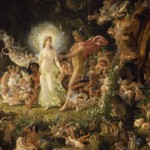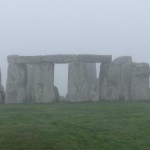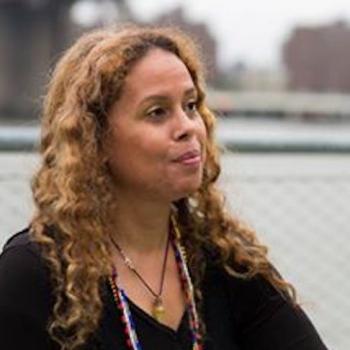A piece I wrote has created a bit of an internet furor, and so I’d like to clarify some things.
My name is Rhyd Wildermuth. I am the co-founder of Gods&Radicals, a non-profit Pagan Anti-Capitalist publisher, where I am currently the Managing Editor. I’m also a monthly columnist for The Wild Hunt and co-founder of (but am not involved in organising this year) Many Gods West, a polytheist conference in Olympia, Washington. You may also recognize my name as one of the contributors to the group blog, A Sense of Place here on Patheos, and my writing can also be found at Paganarch.
I identify as a Polytheist, both ‘devotional’ and ‘relational.’ I have also studied druidry with OBOD, have identified somewhat with Welsh Reconstructionism, and consider myself an Awenydd. Politically, I identify as a Marxist and an anarchist, and have always been quite upfront about those identifications (thus ‘Paganarch,’ the title of my blog).
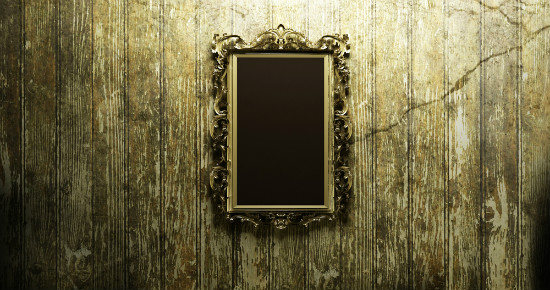
So, with all that upon the table, I’d like to talk about the matter of the New Right and the criticisms levied against myself on account of something I wrote.
Confronting The New Right
The piece in question was posted on the 24th of March as a resource supplement to a long-read article by Shane Burley on Augustus Sol Invictus. Invictus is a libertarian candidate, a self-identified Thelemic Pagan, and also a Fascist. More information about his political and religious views can be found in that article, as well as others written by Shane Burley.
The information page, called Confronting The New Right, was crafted by me in order to provide more information about the New Right to readers who were unfamiliar with that ideology. I consulted with several others regarding the information therein, who helped refine the language and provided additional resources; however, I claim full responsibility for its contents. In fact, according to the bylaws of the non-profit which runs Gods&Radicals, I (as the Managing Editor) am fully responsible for all content on the site, including what’s written by others. Though the opinions, political stances, and spiritual affiliations of Gods&Radicals writers and board-members vary widely, all editorial responsibility falls upon me, not them.
I continue to stand by everything which is written there, though there is one sentence I would like to correct. I will discuss that in a bit.
First, though, I’d like to clarify some misunderstandings and to address a few of the criticisms regarding my piece. While the vitriol and falsehoods contained in some of the critiques make it a little difficult to dissect their arguments, I believe they fall into three categories:
• Guilt by Association: the analysis I provided directly equates Pagan and Polytheist beliefs with the New Right
• Leftist Infiltration: that I am part of a leftist infiltration of Polytheist belief, and not a Polytheist myself.
• “Red Scare” or “Witch Hunt”: by discussing intersections between New Right ideology and some Pagan beliefs, I am attempting to demand ideological or political purity.
I’ll discuss each of these in turn.
Guilt By Assocation
In the most thoughtful of the critiques, Guilt By Association, John Beckett states:
This article associates many of our most meaningful and vibrant traditions with some of the most vile ideologies lurking at the edges of our community.
And in her post, Are We Fascists? According to Gods&Radicals…Maybe, Galina Krasskova writes:
“If I ever had any doubt that Rhyd and his cadre are hostile to the growth of polytheism, to our individual traditions, and to devotion in general, this article has put those doubts to rest. It shows their true agenda, which is the destruction of our individual traditions, the silencing of opposing voices, the silencing of religious voices, the end of polytheism. They are drawing a false equivalency between those who have regard for tradition and those who are racist, classist, and cruel.”
I am a polytheist. When I draw attention to the intersections of New Right ideology with reconstructionism and devotional polytheism, I am not doing so as an outsider. So, the assertion that I am attempting to bring an ‘end of polytheism’ is a bit odd. I am a polytheist.
I am also not accusing all polytheists (or anyone else) of being Fascist. If I were, then I would also be a Fascist. The piece I wrote draws no equivalency between specific Pagan-aligned traditions and the New Right. Rather, I draw attention to places where New Right ideology intersects, could influence or currently influences Paganism, including the traditions I am a part of.
Allow me to repeat my introduction to that section:
Before continuing, it is important to note that the presence of New Right ideas in any Pagan or Magical Tradition does not mean the tradition itself is part of the New Right. Often times the adoption of these ideas is unconscious, particularly since many advocates of New Right ideology do not present their ideas as part of a political stance. In fact, many ideas are presented as overtly ‘apolitical,’ deriving from common sense, tradition, lore, or the will of the gods.
The bolded text is in the original.
A similar warning against false associations ends the section:
“Again, it should be noted that none of these traditions are inherently aligned with the New Right. In the piece, not only is this second statement bolded, but it is also a different colour for emphasis.”
Regarding my warnings, John Beckett writes:
“The section has disclaimers at the beginning and the end: ‘it should be noted that none of these traditions are inherently aligned with the New Right.’ The problem – as any competent magician should know – is that association is strong and disclaimers don’t work. In my earliest baby Pagan days, I was taught that magic doesn’t understand “not” – always write your spells using positive language.”
From this I take to mean that my caveats were either not read or were seen as dishonest. The argument that magic doesn’t understand ‘not’ intrigues me, though—the notion that the gods, spirits, and magical currents cannot understand ‘no’ seems worrying. I say ‘no’ to gods and spirits and friends and employers all the time, almost as often as I say ‘yes.’
But three is a magical number for druids, so let me restate this. The presence of ideas espoused by the New Right in any Pagan tradition or belief system does not mean the tradition or belief system is part of the New Right.
I do not know if there is stronger language I can use, without suggesting that there are no intersections at all, or that the New Right has no influence on Pagan traditions. Unfortunately, such a statement would be untrue.
In fact, I suspect a lot of the anger over the piece is on account of how close New Right ideology mirrors some Pagan and Polytheist ideas which were seen—especially to those unfamiliar with the New Right—as essentially Pagan or apolitical.
Leftist Infiltration
Some of the criticisms are related to a broader conversation regarding my work and that of Gods&Radicals. From John Beckett’s piece:
“Rhyd and his compatriots at Gods & Radicals put their politics first, and that’s fine. But some of us put our Gods first. Or we put Nature first. Or we put our magic first. Or we put our families and our communities first. And some of us agree with their diagnosis of the world’s ills but strongly disagree with their prescription. The acceptance of the genuine existence of many Gods or the reverence of Nature does not lead directly to the conclusion that Marxism and anarchy are the only or even the best approaches to politics.”
Do I put my politics first? I don’t actually know what that means. Do I favor political ideology over what the gods say to me? Do I favor political action over spiritual activities? This is not a question I can answer, because in my world, they inform each other and are inextricably linked. My gods help me understand my relations to politics, and my politics helps me understand my relationship with my gods. There is no wall between them for me.
It is impossible for me to prove this to another person, particularly when they are certain it is otherwise. That’s fine. But I will say it anyway, as I believe this to be true. I also believe that humans must always take responsibility for the manifestation of their ideas, values, and beliefs and never displace the role of human agency in our political and theological beliefs.
Galina Krasskova’s post, Decisive Moment, further accuses me:
“We have a group of people who have extreme political views – and they are trying to radicalize polytheism, and even suggesting that those want to be apolitical and focus on religion are fascists– who are systematically targeting both polytheisms and leading figures in the movement. They are using censorship and thought policing and playing on our political fears and they are willing to use threats and force and even going to the police to quell those who think differently than they. If you’re ok with that, then you’re going to live in that community. If you’re not, you need to speak up now before this becomes the norm.”
While the latter’s rhetoric is a bit extreme, both writers admit the possibility that political views might shape beliefs and practice. Unfortunately, both (particularly Krasskova) choose to focus primarily on leftist views on polytheism.
This should not be surprising, though. An essay from Krasskova (The Battle For Polytheism’s Soul?) recently appeared with her consent on a right-wing, Hindu Nationalist news site which also features anti-Muslim and anti-leftist rhetoric. There, she makes clear how she sees differences in opinions about the gods:
“Secondly, yes, our polytheistic ancestors were – with occasional exceptions– tolerant of every possible approach to polytheism. Look where it got them. Exterminated. So maybe we might want to rethink reifying “tolerance” of every assed up, non-theistic view put forth as ‘polytheism.’ We have clear evidence of where such tolerance leads. Perhaps we can afford to be tolerant when we’re not under siege but that day is not today.”
And in a post entitled, Black Flag, Krasskova identifies herself thusly:
“Secondly, yes, our polytheistic ancestors were – with occasional exceptions– tolerant of every possible approach to polytheism. Look where it got them. Exterminated. So maybe we might want to rethink reifying “tolerance” of every assed up, non-theistic view put forth as ‘polytheism.’ We have clear evidence of where such tolerance leads. Perhaps we can afford to be tolerant when we’re not under siege but that day is not today.”
“I’m adamantly opposed to leftist politics and especially to anarchy. I believe in hierarchy. If I lived in any other country I’d be a staunchly conservative monarchist. I believe the best and brightest should be in control and that they have an obligation to see to the welfare of those NOT in power. I’m a tribalist, a believer in sacral kingship. I believe our world is incredibly broken. I think the time is coming where we will likely be called to hoist the black flag, to rise up and tear down these dehumanizing structures, to scour our world clean. I think the corporations are a blight on our political arena. I think the way poverty has been criminalized is sickening and shameful. I have looked at the exact same social sicknesses that my leftist colleagues have looked at and come to very different conclusions about the reasons for them and the solutions needed. To me, this all stems from a breakdown of natural, divinely ordained hierarchy, with people abrogating both piety and their responsibilities to themselves, their families, their communities, and all those under them within that hierarchy.” (emphasis mine)
Though Krasskova is hardly alone in these views, it might be useful to wonder why so much effort has been made to decry the information on the New Right I compiled. Tribalism, Sacral Kingship, rulership of the fittest, and the notion of a natural, divinely ordained hierarchy are well-attested and integral ideas of the New Right.
Is there a leftist infiltration of Polytheism? And am I—and the writers of Gods&Radicals—leading it? Or did I, by gathering information about the New Right hold an uncomfortable mirror up to a tradition I am a part of? Have I violated sacred traditions, or merely revealed their political aspects?
While I and the writers of Gods&Radicals are quite open about our political views and how they relate to our practices and beliefs, it might be a good time for others to consider being more open about this, too.
Red Scares & Witch Hunts
In the same essay, John Beckett asserts the following:
“It’s a call for ideological purity reminiscent of McCarthyism, and if taken too far (and someone somewhere always takes things too far) it can lead to witch hunts. The irony of witches leading witch hunts would be amusing if this wasn’t so serious.”
And from Anomalous Thracian, the founder of Polytheist.com, on a public facebook post:
“Important to remember that this same sort of document circled in the US around 25 years ago, igniting the Satanic Panic, which sent the entire country (nay, the world..?!) into a frenzy of paranoia around witchcraft, magic, delusions of baby-killing and child-ritual-trafficking, and a whole lot of thinking that Dungeons and Dragons would open a portal to the underworld and unleash a literal apocalypse.”
“And then about, what, twenty five or thirty years before that, the same thing, in the McCarthy Era. Different language, different scapegoats, same paranoid and delusional fear-mongering propaganda.”
There is some great degree of irony in a leftist witch being declared a McCarthyist or attempting to initiate a witch-hunt.
The ‘Red Scare’ was a time when artists, intellectuals, writers, actors, and many others were investigated by the House UnAmerican Activities Commission, led by Joseph McCarthy and influenced by J. Edgar Hoover and powerful business people. Radicals of all sorts—particularly civil rights activists—were investigated for potential associations with the Communist Party. People with suspected associations with Communist organisations or even sympathies (‘fellow travelers’) were blacklisted from trade unions, actors guilds, publishers, and many other artistic and professional organisations, effectively silencing radical voices for decades.
The Witch Trials have been variously described by many authors, but Feminist author Silvia Federici’s Caliban & The Witch perhaps best elucidates the historical and political processes which led to the arrests, trials, imprisonments, and burnings of heretics and witches.
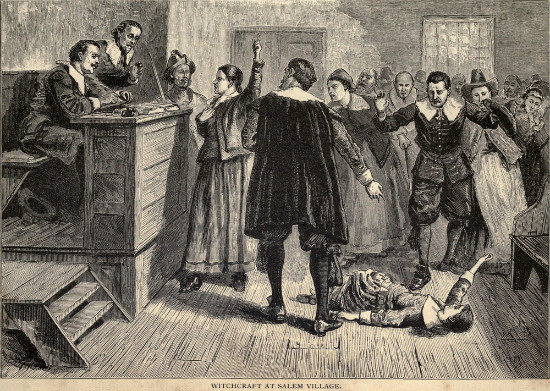
In both cases, there was a political agency obscured by the hysteria and scapegoating. The Red Scare significantly reduced the influence of leftist critique in the United States at the same time that it strengthened the power of Capitalists and the State against workers. Despite my own ideological differences with Communism, it is, at its core, a political narrative which seeks to liberate workers from exploitation. The Red Scare didn’t happen in a political vacuum: the State and Capitalists attacked people for Communist leanings in order to weaken resistance to State and Capitalist power.
Silvia Federici has convincingly shown that the Witch Trials were driven by similar political and economic motives—that is, the creation of the proletariat and the breaking of resistance to increases in State authority and the rise of the Capitalist. The same mechanism was used again in Wiemar Berlin (a leftist, Jewish, queer, and occult stronghold) as the Nazis rose to power, in the arrests of anarchists and socialists in the United States in the early 1900’s, and again during the McCarthy era.
So, with that background in mind, let’s return to the question. Am I attempting to initiate a witch hunt or red scare?
In the piece I wrote, in the section entitled What Else Can We Do?, I offer four suggestions. They are:
• Ask Uncomfortable Questions
• Demand Clear Stances From Leaders
• Build Strong Connections Across Traditions
• Challenge Divine Proclamations.
None of these assert that people should blacklist Pagans with suspected New Right associations, nor put anyone on trial. In fact, the text of the third assertion specifically argues against seeing people as ‘other’:
“Beware the tendency of many Pagan groups to create us vs. them dichotomies. In fact, if another group is ‘the enemy,’ consider asking why. Isolation is an essential part of authoritarian cults, and a great way to ensure group-think. Even people with apparently opposite theological stances have much more in common than they first appear.”
I am arguing specifically against creating enemies, and suggesting that the tendency of some traditions to create ‘others’ is dangerous and plays heavily into New Right ideology. A Wiccan, a Polytheist, an Animist, and a Humanist have much more in common with each other than not, and my experience working with Gods&Radicals has more than shown me that we have a lot more to teach each other than many of the online debates ever suggest.
Despite the fact that there are, indeed, writers and leaders who openly claim allegiance with many of the ideas of the New Right, it is the ideas which are the problem, not the people. In fact, we must not fall into that trap when confronting dangerous ideas—that’s the tool of Fascism, not of liberation. Humans are not the ideas or beliefs they hold, anymore than they are the color of their skin, their genitals, their ability, or their sexual orientation.
Returning To The Heart of the Matter
Though I’ve seen a significant amount of criticism from people within my own religious community, I’ve received much more overwhelming support for the article in question. This support has come from all sorts of people, but most has been from those who have been worried about these New Right intersections far longer than I have been.
The extreme rhetoric regarding me or this piece is obscuring a much larger issue. As I noted at the beginning of this essay, the information page was presented as a supplementary resource to the article about Augustus Sol Invictus, a known Fascist and New Right candidate who shares much of the same theology and practices as some of the fiercest critics of my piece.
Paganism in general—and apparently Devotional and Reconstructionist Polytheism in particular—have been long overdue for a reckoning. How do we differentiate our own practices and beliefs from someone whose identical practises and beliefs actually lead them to advocate for racial purity or separtism, the primacy of European gods, eugenics to prevent the birth of disabled people, and even human sacrifice? What is really the difference between the Fascism of Augustus Sol Invictus, or New Right ideology of Stephen McNallen and Alain de Benoist, and the rest of polytheist belief?
Tribalism, Sacred Kingship, Traditionalism, natural hierarchies (specifically, ‘warrior/priest/cultivator’), and anti-egalitarian notions are all crucial aspects of New Right ideology, along with a constructed threat to the revitalisation of ‘European’ cultures. In Europe, the New Right primarily focuses on Islam and immigrants as the threat to the return of ancestral cultures, along with extreme rhetoric about the ‘radical left’ or Marxists.
For some American Polytheists, it appears the enemy is the same, except the enemy at the gates also happens to be someone who dared compile information that’s been readily available for years. And as many of my co-religionists seem eager to forget, I’ve been within the gate this entire time.
And that’s where I must admit my one error in writing that piece. There is currently a debate occurring on who is and who is not allowed to be a devotional polytheist. For some, devotional polytheism requires that ‘the gods are the final authority,’ for others, human choice is crucial.
In stating that “Because Devotional Polytheism places final authority in ‘the gods’ . . .,” I accepted a minority view of my own religion. So, I will restate that paragraph here, and make changes on the site as such:
“Because some Devotional Polytheists place final authority in ‘the gods’ and emphasize hierarchical relationships (between human and god, priest and devotee), ethical questions cannot be challenged by concerned people because ‘the gods will it.’”
There are some deeply difficult questions that we need to ask. Do the gods want us to return to ‘tribal’ societies, do the gods demand we war against Muslims and Atheists and Leftists, do the gods demand we institute strict hierarchies and authority-relationships between priests and the rest of us? And did those gods happen to notice those are the same ideas of the New Right?
Perhaps some gods do want that, but that leads us to another question:
Do we want that?
It’s that conversation that I wish we were having, not whether or not “Gods & Radicals should be retitled ‘Radicals With Gods,’” as John Beckett asserts, or whether or not my true agenda “is the destruction of our individual traditions, the silencing of opposing voices, the silencing of religious voices, the end of polytheism,” as Galina Krasskova proclaims.
It’s a conversation that we all really need to have soon. And despite the deep anger and wild accusations about my perceived intentions, I’m honored and humbled to have been able to initiate it.
 Rhyd Wildermuth is the Managing Editor of Gods&Radicals
Rhyd Wildermuth is the Managing Editor of Gods&Radicals


